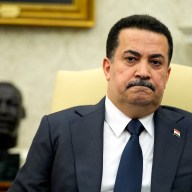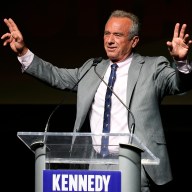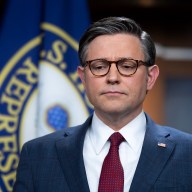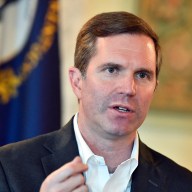DEH-E-BAGH, Afghanistan – The new secretary general of NATO made a visit to a Canadian model village in Kandahar province Thursday, praising the project and making it clear he would like Canadian troops to remain in Afghanistan after 2011.
But Ottawa says its combat forces will leave by 2011 as planned.
Anders Fogh Rasmussen was on his first trip to Afghanistan as NATO secretary general. After visiting Canada’s Deh-e-Bagh project, he said he doesn’t want to interfere in the domestic politics of individual nations.
“But from an alliance point of view, I would strongly regret if that became the final outcome of the Canadian considerations,” Rasmussen said of Canada’s decision to end the military mission in 2011.
“At the end of the day, it’s a question of our own security. We cannot allow Afghanistan to once again to become a safe haven for terrorists. I also think it’s in Canada’s interests to ensure a peaceful and stable Afghanistan.”
In response, Foreign Affairs Minister Lawrence Cannon said the NATO secretary general’s comments are “an acknowledgement of the great work Canada has done in Kandahar.”
“However, our government is abiding by the motion passed in Parliament in 2008. That is: our combat forces will leave by 2011. We’re staying the course,” Cannon said.
The NATO leader, who was accompanied on his tour by U.S. Gen. Stanley McChrystal, the new commander of American and NATO forces in Afghanistan, and Canadian Brig.-Gen. Jonathan Vance, commander of Canadian troops, said it’s up to each individual nation to decide how to contribute to NATO efforts.
“What I can do, is to encourage alliance members to do their utmost to ensure continued solidarity within our alliance,” Rasmussen told reporters in the recently rebuilt district centre of Deh-e-Bagh.
Before a brief walk outside the centre’s walls to talk to area merchants, Rasmussen said that a military solution alone will not bring stability to Afghanistan.
“This is exactly the approach we will pursue in the coming years,” he said.
“Obviously we need to strengthen military efforts to improve the security situation, but we also have to realize that there is no military solution solely. So, we have in parallel with our military efforts, to step up our endeavours concerning civilian reconstruction and this project is an example of how we will do it in the future.”
The Dand district, where Deh-e-Bagh is located, has been relatively peaceful region bordering Kandahar city.
But the gravel courtyard of the district centre lays strewn with the crumbled concrete remains of the former district centre, which was attacked three months ago by a suicide bomber.
As the high-ranking military officials met inside the hastily rebuilt centre, medics prepared outside to receive Afghan National Army casualties from a nearby operation. The wounded were taken elsewhere, but everywhere in Afghanistan there are daily reminders of war.
The model village approach is an effort to win the support of Afghans with the promise of reconstruction and employment. Deh-e-Bagh is just the first in what Canadian, and now NATO, officials hope will be many.
Canadian soldiers have quietly overseen the work, which was carried out by more than 100 Afghans. Solar lights have been installed, the centre itself rebuilt from the rubble and an irrigation canal refurbished.
The work continues, and will include improvements to the area school and roads, according to a list drawn up after consultation with locals.
Vance, who has said the model village located south of Kandahar city “is counter-insurgency,” said he appreciated the recognition of the hard work of both the military and civilian contingent involved.
“That someone like the secretary general would like us to stay is vindication, I suppose; certainly reinforces the fact that our men and women, military and civilian, have done tremendous work here,” he said.
But the commander said whether or not Canadian troops remain beyond 2011, is a decision for Canada to make.
“Whether Canada is here or not, is a decision not for me. If Canada was to stay, I’d be more than happy to serve again,” he said.
“There is a thing that happens to you when you come to Afghanistan, where you see the potential.”
The international coalition’s exit strategy for Afghanistan relies on the development of Afghan national security forces – both its army and police – and their ability to hold their own against an insurgency that may not disappear entirely.
While Afghan forces have made much progress, and will make significantly more by 2011, Vance said he doesn’t believe they will be able to stand alone by 2011.
“Indeed, there would have to be international support in Kandahar beyond 2011, whether that’s Canada or another country.”
Ken Lewis, the representative of Canada in Kandahar, said Canada’s development efforts in Afghanistan will continue, regardless of what happens with the military mission.
“We’ll be remaining with diplomacy and development,” he said.
He said there’s a been a resolution in Parliament and “it’s pretty clear the military will leave but we’ll need a security piece here, somehow.”
“We need security forces,” he said, in order to continue with the development work.
















